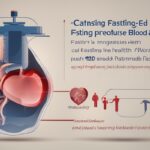Hey there, fasting enthusiasts! If you’ve been exploring the world of fasting—whether it’s intermittent fasting, prolonged water fasting, or another method—you’ve likely wondered how to optimize your experience. Fasting can do wonders for your health, from improving metabolic flexibility to promoting autophagy (the body’s cellular cleanup process). But let’s be real: going without food for extended periods can sometimes leave you feeling drained or worried about nutrient deficiencies. That’s where supplements for fasting come in. In this post, we’ll dive deep into the best supplements to support your fasting journey, backed by science and practical know-how. Whether you’re a newbie or a seasoned faster, I’ve got tips to help you feel your best while reaping the benefits of fasting. Let’s get started!
What Is Fasting, and Why Consider Supplements?
Fasting, at its core, is the voluntary abstinence from food and sometimes drink for a specific period. It’s been practiced for centuries across cultures for spiritual, health, and even therapeutic reasons. Today, science supports fasting for benefits like weight loss, improved insulin sensitivity, and reduced inflammation (Mattson et al., 2017). However, when you’re not eating, your body might miss out on essential nutrients, especially during longer fasts. That’s where supplements during fasting can play a crucial role. They help bridge nutritional gaps, maintain energy levels, and prevent side effects like headaches or muscle cramps. But not all supplements are fasting-friendly—some can break your fast by spiking insulin or providing calories. So, how do you choose the right ones? Let’s break it down.
Key Supplements for Fasting Support
When it comes to fasting supplements, the goal is to support your body without interrupting the fasting state. Here are some of the top options that align with most fasting protocols, especially intermittent fasting or water fasting.
- electrolytes (Sodium, Potassium, Magnesium): During fasting, your body loses electrolytes through urine, especially if you’re on a low-carb diet or in ketosis. Low levels can cause fatigue, headaches, or the dreaded “keto flu.” Supplementing with a sugar-free electrolyte mix can keep you hydrated and energized (Volek & Phinney, 2011).
- Multivitamins: A high-quality multivitamin can help cover micronutrient bases, especially during extended fasts when you’re not getting vitamins from food. Look for one without added sugars or fillers.
- Omega-3 Fatty Acids: These healthy fats support brain health and reduce inflammation, which can be beneficial during fasting as your body undergoes stress (Calder, 2015). Opt for a pure fish oil or algae oil supplement.
- Vitamin D: Many of us are deficient in vitamin D, which supports immunity and mood—both critical when fasting. Since it’s fat-soluble and doesn’t break a fast, it’s a safe bet (Holick, 2017).
Remember, always consult with a healthcare provider before starting any new supplement, especially if you have underlying conditions or are on medication.
Supplements to Avoid During Fasting
While some supplements enhance your fasting experience, others can sabotage your efforts by breaking your fast or disrupting metabolic benefits. The key is to avoid anything that triggers an insulin response or provides significant calories. Here’s what to steer clear of:
- Protein Powders or BCAAs: Branched-chain amino acids (BCAAs) and protein supplements can stimulate insulin and mTOR pathways, halting autophagy and breaking your fast (Wilkinson et al., 2013).
- Sugary or Flavored Supplements: Gummies, flavored electrolyte drinks, or vitamin chews often contain sugars or artificial sweeteners that can spike blood sugar.
- Caloric Pills or Oils: Things like MCT oil or calorie-dense supplements are great for keto diets but will break a strict fast if consumed in significant amounts.
- Certain Herbal Supplements: Some herbs, like ginseng, may affect blood sugar levels, so research or consult a professional before using them during fasting.
Stick to zero-calorie, non-insulin-spiking options to maintain the integrity of your fast. When in doubt, check labels or opt for plain, unflavored versions of supplements for fasting.
How to Time Supplements During Fasting
Timing is everything when it comes to fasting and supplements. Taking them at the wrong time could either break your fast or reduce their effectiveness. For intermittent fasting, like the 16:8 method (16 hours fasting, 8 hours eating), you can often take supplements during your eating window without issue. However, if you’re doing a longer fast, such as a 24- or 48-hour water fast, you’ll need to strategize. Electrolytes, for instance, are best taken throughout the day to maintain balance, especially if you’re active. Fat-soluble vitamins like D or omega-3s can be taken anytime since they don’t require food for absorption. Water-soluble vitamins, like B-complex, might cause stomach upset on an empty stomach, so consider taking them with a small sip of water or during a refeeding window. The key is consistency—find a schedule that works for you and stick to it.
Scientific Insights: Do Supplements Really Help During Fasting?
Let’s get into the science behind supplements while fasting. Research shows that fasting puts the body into a unique metabolic state, often leading to ketosis, where fat becomes the primary fuel source (Anton et al., 2018). During this time, electrolyte imbalances are common due to reduced insulin levels and increased water loss. Studies suggest that supplementing with sodium, potassium, and magnesium can prevent symptoms like dizziness or cramps (Volek & Phinney, 2011). Additionally, fasting can deplete certain nutrients over time, especially if your diet isn’t balanced during eating windows. A 2016 review highlighted that multivitamins might help mitigate deficiencies during caloric restriction, though more research is needed specifically for fasting (Benton et al., 2016). While supplements aren’t a magic bullet, they can act as a safety net to support your body’s needs during fasting.
Practical Tips for Using Supplements Safely While Fasting
Navigating fasting with supplements doesn’t have to be complicated, but it does require some mindfulness. I’ve been fasting on and off for years, and I’ve learned a few tricks to make supplementation seamless. First, always start with small doses if you’re new to a supplement—your body might react differently during a fast. Second, prioritize hydration; supplements like electrolytes work best when you’re drinking enough water. Third, keep a journal to track how you feel after taking certain supplements. Did that magnesium pill help with muscle cramps, or did it upset your stomach? Personal experimentation is key. Lastly, don’t rely on supplements as a crutch—focus on a nutrient-dense diet during your eating windows to minimize the need for extra pills. Fasting is about balance, and supplements should complement, not replace, good habits.
So, what’s the takeaway? Supplements for fasting can be a game-changer if used wisely. They support your body through the challenges of fasting, helping you stay energized, hydrated, and nutritionally balanced. Whether it’s electrolytes to combat fatigue or a multivitamin to fill nutrient gaps, the right fasting supplements can enhance your experience and results. Just remember to choose products that align with your fasting goals, time them appropriately, and consult a professional if you’re unsure. Fasting is a powerful tool for health, and with a little support from science-backed supplementation, you can make the most of it. Have you tried any supplements during fasting? Drop your thoughts or questions below—I’d love to hear about your journey!
References
- Anton, S. D., Moehl, K., Donahoo, W. T., Marosi, K., Lee, S. A., Mainous, A. G., … & Mattson, M. P. (2018). Flipping the metabolic switch: Understanding and applying the health benefits of fasting. Obesity, 26(2), 254-268.
- Benton, D., Young, H. A., & Gibbs, N. (2016). The effect of micronutrient supplementation on mood and behavior: A systematic review. Nutrients, 8(11), 697.
- Calder, P. C. (2015). Marine omega-3 fatty acids and inflammatory processes: Effects, mechanisms and clinical relevance. Biochimica et Biophysica Acta (BBA)-Molecular and Cell Biology of Lipids, 1851(4), 469-484.
- Holick, M. F. (2017). The vitamin D deficiency pandemic: Approaches for diagnosis, treatment and prevention. Reviews in Endocrine and Metabolic Disorders, 18(2), 153-165.
- Mattson, M. P., Longo, V. D., & Harvie, M. (2017). Impact of intermittent fasting on health and disease processes. Ageing Research Reviews, 39, 46-58.
- Volek, J. S., & Phinney, S. D. (2011). The Art and Science of Low Carbohydrate Living. Beyond Obesity LLC.






